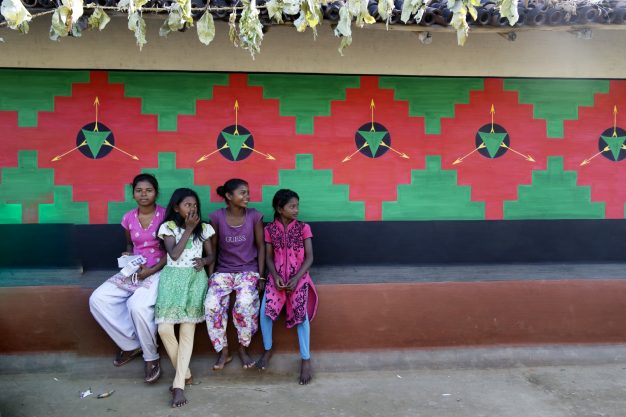Jharkhand, the “Land of Forests”, is a state in the north-east of India that was created by the separation of the neighbouring state of Bihar in 2000. This region, so rich in nature and landscapes, is affected by overwhelming poverty – more than 40% of the population lives below the poverty line. Since 2014, Karuna-Shechen has been supporting many rural and tribal communities in this region.
Jharkhand, its challenges and the need for a holistic approach
Suffering from endemic diseases and nutritional deficiencies, the region’s isolated communities lack the medical resources to deal with recurrent cases of anaemia, malaria and other serious illnesses, or the injuries and disorders that should be harmless, but can be dangerous if left untreated.
Very few humanitarian organisations operate in the state, leaving rural areas without access to basic services. Faced with both a challenge and an opportunity, we initiated our operations in Jharkhand in 2014, with a medical center in Hata, and a mobile clinic to bring basic care to remote villages in the surrounding area.
Gradually, we have expanded our programme coverage and activities: from women’s health and hygiene awareness (more than 6,000 women and girls participating), to early childhood development (96 kindergartens hosting 3,840 small children). We have implemented a holistic approach, working hand in hand with the villagers to address their specific needs and find sustainable solutions together. All our activities are interconnected, creating an interdependence that builds success upon success.
All our activities are interlinked and mutually reinforcing. Together they create an ecosystem that facilitates and encourages the autonomy of communities as they manage their own development.
Shamsul Akhtar, Director of Operations in India
Karuna-Shechen gives disadvantaged communities the tools they need to transform the lives of their people, and become more resilient and self-reliant. In 2019, we helped 65,000 people in Jharkhand, including more than 18,000 who participated in our health programmes.
The opening of the new clinic
Over the years, with the steady increase in the number of patients and our activities, we felt the need to move to larger, better equipped and more suitable premises. Karuna-Shechen then undertook the construction of our own building to replace the current health post whose premises we rent. After 2 years of construction, we inaugurated this new 3-storey, 1,200 m² clinic and operating centre in March 2020. However, due to the epidemic circumstances, our clinic did not open until November 2, 2020, welcoming patients again in compliance with the barrier gestures.

The ground floor is entirely dedicated to medical services: outpatient consultations, pharmacy, pathology laboratory, acupuncture, physiotherapy, radiography, ophthalmology. The clinic is surrounded by nature, with a view of the hills and numerous green areas (inner courtyard, vegetable garden). The first floor is a vocational training centre for capacity building of the villagers, especially for women’s empowerment, but also for further training of our employees. Finally, the second floor will house the administrative offices, staff rooms and kitchen.
This new building will not only improve and facilitate our medical interventions, but will also provide our staff with the resources necessary for the overall development of the beneficiary communities.
Shamsul Akhtar, Director of Operations in India
Efficiency, well-being and respect for the environment
Karuna-Shechen benefited from the advice and expertise of Sylvie Meunier, an architect specializing in the design of buildings for clinics and hospitals run by non-profit organizations. The clinic was designed according to 3 principles of effective altruism : “functional,” to facilitate good quality medical care.service, “user-friendly,” to make a pleasant place to live and work for our beneficiaries and our teams, and “ecological,” to minimize its environmental impact and be in harmony with nature. Away from the city center , surrounded by green hills and it’s own vegetable garden, the new clinic is more than a place of care, it is a space that promotes the well-being of body and mind !
To provide a pleasant space, we designed the building to cope with the high temperatures of the region while minimizing energy consumption. The building was oriented to take advantage of the prevailing wind which blows 60% of the time. The walls of the rooms were made with perforated bricks to harness the natural ventilation and thus reduce the need for fans. We do not use air conditioning ! The layout of the rooms took advantage of the orientation of the sun during the day, in order to limit the need for electricity. Special glass in the windows and a white membrane on the roof reflect the sun’s rays, keeping the building cool.
An underground cistern and low-flow taps ensure efficient and careful water management.

Finally, the majority of the clinic was built with materials purchased locally in Jharkhand, as well as traditional materials linked to our vocational training workshops. The bamboo that grows in the region was woven by local women to make sunshades for the windows. This is the same bamboo that the women use for their newly learned handicrafts.
“When passion meets compassion in action” is how I sum up my experience on this Karuna-Shechen project. I was able to combine altruism with a love for my profession as an architect and thus give an extra meaning and dimension to what I do. Consider this recipe if you are tempted to embark on a humanitarian project. You won’t be disappointed” – Sylvie Meunier.
This clinic marks a new step for Karuna-Shechen towards even more integrated and altruistic programmes. Step by step, hand in hand, we give our beneficiaries the tools to accomplish their own autonomy and freedom. Support our action !
